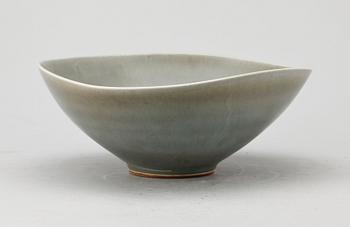Berndt Friberg
SKÅL, stengods, Berndt Friberg, Gustavsbergs studio, 1900-talets andra hälft.
Gråblå harpälsglasyr. Höjd 13, diameter ca 33cm. Daterad "Y".
Smärre slitage. Repor.
Designer
Berndt Friberg was a Swedish ceramicist and master potter. He began working with ceramics at a very young age. Eventually, he trained in Denmark before returning to Sweden and Raus Stenkärlsfabrik. After a time at Svedala Slipvarufabrik in the 1920s, Berndt Friberg was employed at Gustavsberg porcelain factory in 1934. He was primarily hired to threw the objects designed by the artistic director Wilhelm Kåge. From 1937, Friberg also worked with Stig Lindberg. Friberg made his debut as an independent ceramicist in 1941 when he exhibited at the Gustavsberg shop on Birger Jarlsgatan in Stockholm alongside Calle Blomqvist and Stig Lindberg.
Many more exhibitions followed over the years. His first solo exhibition was presented at Nordiska Kompaniet in Stockholm in 1954 and it became a public success. Friberg's talent lay in both designing objects and then being able to throw and glaze them. The result was pieces in various sizes, from small miniatures, with the smallest no taller than a couple of centimetres, to large floor vases. The forms were classical, inspired by Chinese stoneware from the Song dynasty (960-1279). He constantly refined the forms and became a master of glazes. The early glazes were matte, known as hare's fur glazes, and later, towards the 1960s, came the glossy glazes such as "oxblood" and "aniara."
During 1957-58, Friberg began working with various patterns in the glaze. The most sought-after pieces by Friberg are large vases in attractive shapes with the matte hare's fur glazes.
Read more



































